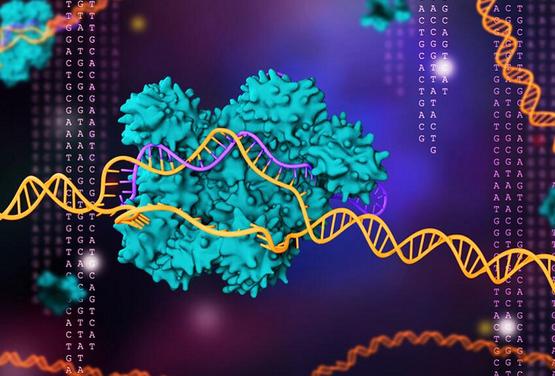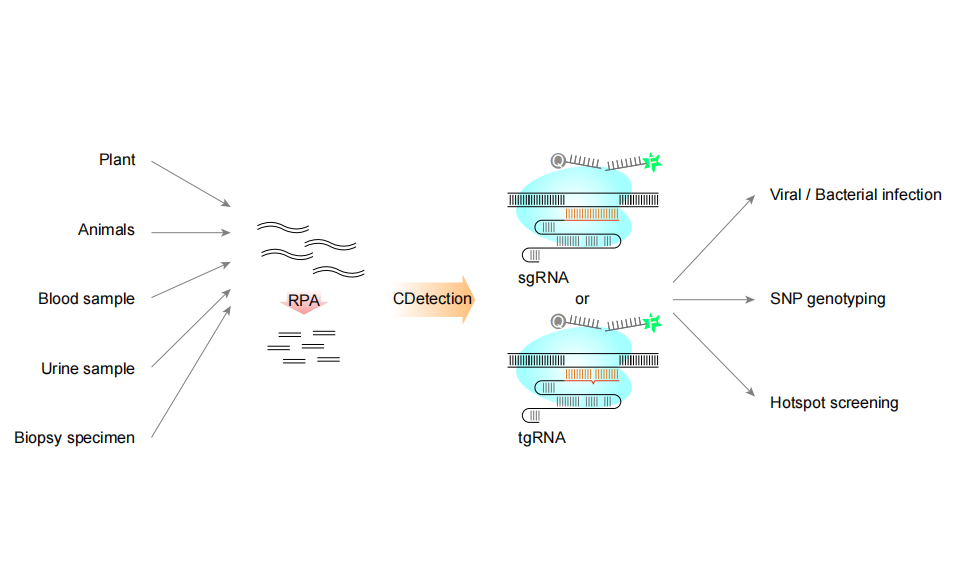- Current Positon:

As a gene-editing system, CRISPR/Cas could precisely recognize the target regions by single-guide RNA (sgRNA) through a complementary base pair, triggering the precise cutting and editing of the target mediated by CRISPR/Cas complexes.
In recent years, Jennifer Doudna's team and Feng Zhang's team in their studies have discovered that CRISPR/Cas12 and CRISPR/Cas13 system has the capacity of collateral cleavage. Besides Cas12a and 13a, Cas12b is also found to have similar collateral cleavage activities providing another unprecedented power to the diagnostic field.

CDetection Technology
CDetection (Cas12b-mediated DNA detection) is a new CRISPR/Cas diagnostic system developed by Dr. Wei Li and Dr. Qi Zhou’s team from the Chinese Academy of Sciences. It utilizes the DNA trans-cleavage activity of Cas12b enzymes (Cas12b, sgRNA and ssDNA fluorescent reporters) and combines recombinase polymerase amplification (RPA).
CDetection could even achieve the detection sensitivity at 1 aM (10-19 M), more sensitive than Cas12a-DETECTR. Moreover, by introducing tgRNA (tuned gRNA), CDetection can distinguish targets differed by a single base. CDetection has been proved its excellent performance for the pathogen detection in different samples such as cell, blood, urine, animal and plant samples, as well as genotyping and single-nucleotide polymorphisms (SNPs) identification, paving the way to wide applications in molecular POCT.
Innovative one-step CRISPR detection technology
After optimization, SynsorBio has developed one-step CDetection by integrating isothermal amplificaion and CDetection in a single reaction system, enabling the limit of detection (LOD) at 150 copies/ml in 15 minutes. Since no liquid handling is required by one-step CDetection after the mixture of reagents during the reaction, the risk of aerosol contamination would be dramatically decreased. Furthermore, according to catalytic mechanism of CRISPR system, amplification products from isothermal amplification process would be digested by Cas/sgRNA complexes upon binding of sgRNAs, which also decrease the risk of aerosol contamination. Therefore, one-step CDetection significantly lowers the demand of the negative pressure environment, together with its excellent performances in diagnostics, leading it to be the ideal technology for low cost and rapid detection.
Due to the outbreak of the COVID-19 pandemic, a novel SARS-CoV-2 detection kit based on the CRISPR/Cas12b system has been developed. SynsorBio has also been developing rapid nucleic acid detection kits, e.g. SARS-CoV2 and other respiratory pathogens.

1. Fei Teng, et al. CDetection: CRISPR-Cas12b-based DNA detection with sub-attomolar sensitivity and single-base specificity[J]. Genome Biology, 2019, 20: 132.
2. Lu Guo, et al. SARS-CoV-2 detection with CRISPR diagnostics[J]. Cell Discovery, 2020, 6: 34.
-
PROFESSIONAL
-
WIN-WIN
-
REALISTIC
-
DILIGENT-RAPID

Copyright: SynsorBio Technology Co., Ltd.

